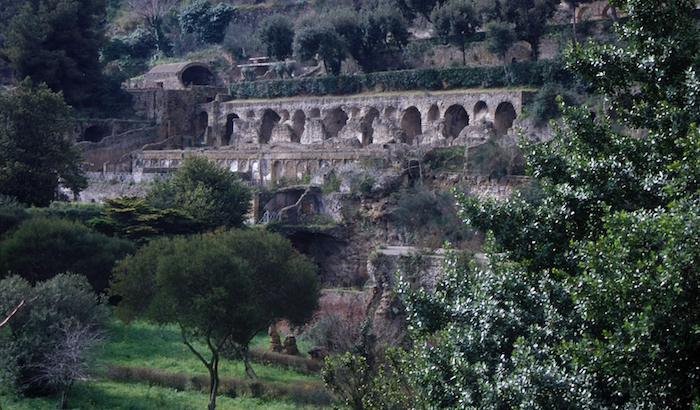Once a month here on the Molten Sulfur Blog, I run content taken from our book Archive: Historical People, Places, and Events for RPGs. This post is one of eighty entries in Archive, each more gameable than the last!
This post is brought to you by beloved Patreon backer Arthur Brown. Thanks for helping keep the lights on! If you want to help keep this blog going alongside Arthur, head over to the Patreon page – and thank you!

Baiae
Ancient Summer Retreat
Located ten miles west of Naples, on the Italian coast, Baiae was a resort town for the ancient Romans. The town boasted a temperate climate, beautiful vegetation, and curative thermal baths. The resort had countless luxurious villas, leisure facilities, and spas. Because of its manmade and natural beauty, Baiae eventually became an attractive destination to many people in Rome. Some praised the resort, like Horace, the world’s first autobiographer, who claimed that no bay outshone the beauty of Baiae’s lush, sandy shores. But others, like Seneca, a philosopher, warned people against the vices Baiae housed. The residents and guests of Baiae were notorious for enjoying a luxurious and hedonistic lifestyle while indulging in frequent beach parties with heavy drinking. Seneca deemed the resort a vortex of luxury and a harbor of vice, and therefore advised that wise, moral men would do well in avoiding the area.
Perhaps adding to the vice already found there, Baiae was a gathering place for the Roman aristocracy in the summer. Julius Caesar built his own villa in Baiae, and Caligula built his famous Bridge of Boats there. Nero owned a villa there and even murdered his mother nearby. Cleopatra was rumored to have been in Baiae when Julius Caesar was killed in 44 B.C. Claudius built a villa for the wife he practically deified, Messalina, and Alexander Severus built several large buildings for his mother. Tiberius died in the Villa of Marius in Baiae, and Hadrian died in Caesar’s villa in 138 A.D., all giving the resort a long history of famous inhabitants and visitors.
The resort was famed for its golden sand beaches framed with lush vegetation. The weather was warm and mild. Even when rare, unpleasant weather struck, the resort’s luxurious accommodations kept sun-soaked visitors and residents comfortable. It was a pinnacle of beauty for as long as time allowed.
Man and nature have tarnished Baiae’s beauty. The resort is in a volcanic region. Magma running through underground chambers caused the lush green earth to rise in some places and sink in others. The changes brought down some of the pale architecture of the Roman elite. In time, an entire port near the city was swallowed up by the ocean, and shortly after this, raiders came and demolished the city that was still above the water. A volcanic eruption diminished a nearby lake and demolished a nearby town. The region slowly succumbed to the sea until portions of Baiae also sank underwater.
Today, parts of the ruins are still underwater, while other parts, such as the temples of Mercury, Venus, and Diana – which acted as bathing facilities – are open to visitors. The underwater ruins of Baiae hold ancient statues, a road running between several taverns and through a private villa, and active fumaroles that release gaseous bubbles and deposit sulfur. There are also ancient, manmade tunnels digging into the hillside near Baiae, close to some temple ruins, leading to hot caverns. Within the caverns is a boiling river that was believed to possibly be the mythic River Styx that, once crossed, led wandering souls to the Underworld.
Baiae in Play
There are many uses for Baiae in a campaign. With this concentration of wealth and power in such a relaxed setting, the city would be a terrific place for the party to play politics. Or, with so many opportunities for debauchery, your PCs could travel to Baiae to decompress, spend their hard-earned loot, and maybe be caught up in an adventure. Perhaps an NPC like Seneca has come to town and is stirring up trouble, claiming Baiae is evil. The villas of the elite are vulnerable to burglars. The PCs may try to apprehend the thief behind a string of heists, or may be the ones carrying them out. With all the death that occurred at Baiae – and the boiling presence of the possible River Styx – the city’s ruins could be overrun with lost souls. Some travel the tunnels in search of the afterlife, but others cling to the lives they lost.






